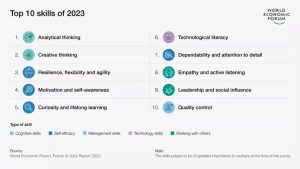Increasing urgency for the reskilling revolution
Companies report that skills gaps and an inability to attract talent are the key barriers to transformation, showing a clear need for training and reskilling across industries. Six in 10 workers will require training before 2027 but only half of employees are seen to have access to adequate training opportunities today. At the same time, the report estimates that, on average, 44% of an individual worker’s skills will need to be updated.
The gap between workers’ skills and future business needs puts the onus on companies and governments to enable learning and reskilling opportunities. Government funding for skills training would help connect talent to employment, according to 45% of businesses surveyed.
For example, while there is continued growth in green jobs in the past four years, as indicated by additional research conducted by LinkedIn for this year’s report, reskilling and upskilling towards green skills is not keeping pace.
“The sustained growth of green jobs is really great news, particularly for job seekers who are facing upheaval in the labour market,” said Sue Duke, Head of Global Public Policy, LinkedIn. “But LinkedIn’s data is clear that while there’s strong demand for talent with green skills, people are not developing green skills at anywhere near a fast enough rate to meet climate targets. There is an opportunity for everyone to help turn this around. Governments must champion the green skills agenda and businesses can and must do more to equip their employees with the skills needed to deliver genuine environmental change.”
In response to the cost-of-living crisis, 36% of companies recognize that offering higher wages could help them attract talent. Yet, companies are planning to mix both investment and displacement to make their workforces more productive and cost-effective. Four in five surveyed companies plan to invest in learning and training on the job as well as automating processes in the next five years. Two thirds of companies expect to see a return on investment on skills training within a year of the investment, whether in the form of enhanced cross-role mobility, increased worker satisfaction or improved worker productivity.
Strong cognitive skills are increasingly valued by employers, reflecting the growing importance of complex problem-solving in the workplace. The most important skills for workers in 2023 are seen to be analytical thinking and creative thinking, and this is expected to remain so in the next five years. Technological literacy, and AI and big data specifically, will become more important and company’s skills strategies will focus on this in the next five years.

Faster reskilling is necessary – and possible. “Our research found that individuals without degrees can acquire critical skills in a comparable timeframe to those with degrees, highlighting the potential for innovative approaches such as industry micro-credentials and skills-based hiring to tackle skills gaps and talent shortages,” said Jeff Maggioncalda, CEO, Coursera. “However, it will require collective action from public and private sectors to provide the affordable, flexible reskilling pathways at scale that displaced workers need to transition into jobs of the future.”
“The latest findings in the Future of Jobs Report renew calls for action from all labour market stakeholders,” said Sander van ‘t Noordende, CEO, Randstad. “Acceleration in digitalization, AI and automation are creating tremendous opportunities for the global workforce, but employers, governments and other organizations need to be ready for the disruptions ahead. By collectively offering greater skilling resources, more efficiently connecting talent to jobs and advocating for a well-regulated labour market, we can protect and prepare workers for a more specialized and equitable future of work.”





